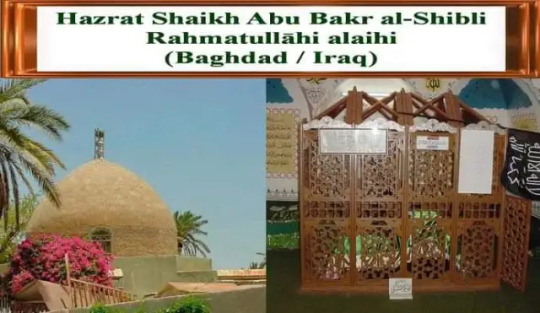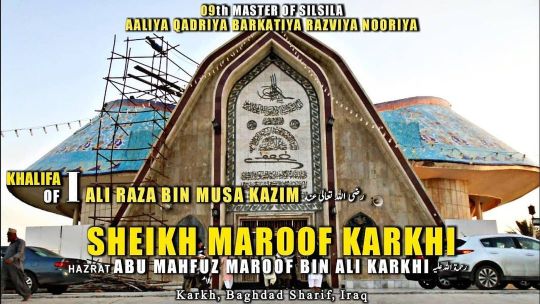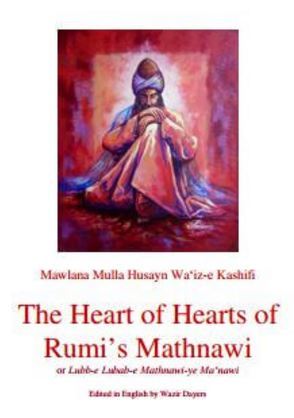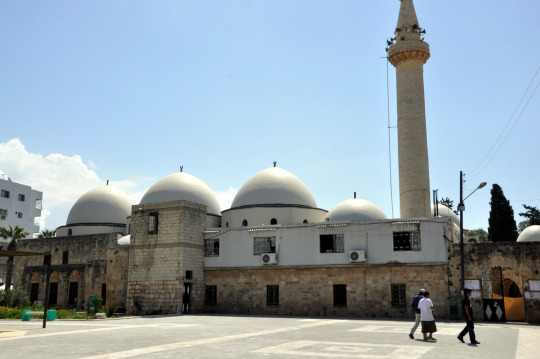#tadhkirat al-awliya
Text

Carl Ernst, Sufism: An Introduction
(citation: Abu Hamid Muhammad ibn Abi Bakr Ibrahim Farid al-Din ‘Attar Nishapuri, Kitab tadhkirat al-awliya’, ed. Reynold Alleyne Nicholson (2 vols., 5th ed., Tehran: Intisharat-i Markazi, n.d.), 1, 136.)
4 notes
·
View notes
Text
The Lowliness of the Self
Peace, one and all…
Beloved Dhu al-Nun al-Misri said: ‘The Real Most High does not honour his servant with any honour more honourable than showing him the lowliness of his self. And he does not dishonour any servant with any dishonour more dishonourable than veiling him so he cannot see the dishonour of the self’.
Quoted in Attar, Tadhkirat al-Awliya

View On WordPress
0 notes
Text

Once Sayyiddina Abu Bakr Shibli ؒwas seen running with a burning brand in hand. Asked his destination, heؒ replied, To the Kaaba, to set it afire, so people, instead of worshipping the House of Allahﷻ, make the Allahﷻ of the House the focus of their devotion.
Attar, Tadhkirat al-awliya', p. 617
0 notes
Text

The Prophet (s) said, "Fatima is part of me. Whatever upsets her upsets me, and whatever harms her harms me."
Sahih Muslim, v. 5, p. 54; Khasa'is Al-Imam Ali of Nisa'i, p. 121-122; Masabih Al-Sunnah, v. 4, p. 185; Al-Isabah, v. 4, p. 378; Seir Alam Al-Nubala', v. 2, p. 119; Kenz Al-Omal, v. 13, p. 97; similar wording is related in Al-Tirmidhi, v. 3, Chapter on the Virtues of Fatima, p. 241; Haliyat Al-Awliya', v.2, p. 40; Muntakhab Kenz Al-Omal, in the margins of Al-Musnad, v. 5, p. 96; Maarifat Ma Yajib Li Aal Al-Bait Al-Nabawi Min Al-Haqq Alaa Men Adahum, p. 58; Dhakha'ir Al-Uqubi, p. 38; Tadhkirat Al-Khawass, p. 279; Yanabi^ Al-Mawadda, v.2, ch. 59, p. 478.
The Prophet (s) said, "Fatima is part of me, and whoever pleases her, pleases me."
Al-Sawaiq Al-Muhariqa, p. 180 & 132; Mustadrak Al-Hakim; Maarifat Ma Yajib Li Aal Al-Bait Al-Nabawi Min Al-Haqq Alaa Men Adahum, p. 73; Yanabi^ Al-Mawadda, v. 2, ch. 59, p. 468.
0 notes
Photo

2nd Muharram ul Harram - Wissal - Hazrat Khwaja Asad al-Din Abu Mahfuz Ma'roof Kirki (Radi Allahu Anhu), Baghdad Shareef : HIS POSITION IN THE SILSILA: Hazrat Asad al-Din Abu Mahfuz Shaykh Ma’roof Ibn Feroz al-Karkhi (Radi Allahu Anhu) is the ninth Imam and Shaykh of the Silsila Aaliyah Qadiriyah Barakatiyah Razaviyah Nooriyah. BIRTH: Hazrat Ma’roof Karkhi (Radi Allahu Anhu) was born in Karkh. NAME: His name is Asad al-Din and is famously known as Ma’roof Karkhi and Abu Mahfooz. HIS FATHER: His father’s name was Feroz. [Safinat al-Awliyah] EDUCATION: He attained all his knowledge under the watchful eye of Hazrat Imam Ali Radi Allahu Ta’ala Anho. [Tadhkirat al-Awliya] HIS EARLY LIFE: Initially, he was a non-Muslim, but even as a child, he had great love for Islam. He used to always spend his time in the company of Muslim children, and often talked to his parents about accepting Islam. His father was not pleased with this, and enrolled him to study under a Christian Priest. The first question the priest asked him was, "Tell me my son, how many people are there in your family?" He said, "Myself, my father and my mother." The priest then said, "Very well, now say Esa Alaihis Salam is the third god of three (trinity)." Hadrat Ma’roof Karkhi Radi Allahu Ta’ala Anho says, "Even during my time as a non-Muslim my heart did not accept to say what he commanded me to. When I refused to say this, he began to beat me severely. The more he beat me, the more I rejected his teaching. He finally became weary of me and asked my father to imprison me. I was thus locked in a room for three days and every day, I was given one bread, which I did not even touch. When I was taken out, I ran away. As I was the only child to my parents, they were very sad and they sent a message to me saying that I should return to them and I would have the right to accept whichever faith I wished, and that they too will accept the same faith. I then went to Hadrat Ali Rida Radi Allahu Ta’ala Anho and accepted Islam at his hands. I then went home with this most valuable gift of Islam, and alHumdulillah, my parents also accepted Islam." [Tadhkirat al-Awliya, Page 221] SHAYKH-E-TARIQAT: He became https://www.instagram.com/p/CSeZWNSpJyI/?utm_medium=tumblr
0 notes
Text

TheSufi.com presents masterpieces of Literature by Sufis and Saints which can be downloaded in eBook format (PDF). This is a small effort to collate as much literature as possible and bring it to readers in most accessible format and manner.
Download these for free and use them for Kindle, iPads, Andriod Tablets or read them on your PC at https://www.thesufi.com/sufi_ebooks.html
The Masnavi Maanvi (The Couplets), Translated by E. H. Whinfield
Fihi ma Fihi (In it, what is in it) or Discourses of Rumi, based on the original translation by A.J. Arberry
Masnavi e Manavi (Book 1- 6) , Translated & Abridged by E. H. Whinfield (6 Volumes).
The Heart of Hearts of Rumi’s Masnavi [or Lubb-e Lubab-e Mathnawi-ye Ma‘nawi]
Divan-e-Hafiz (in Farsi/Persian)
Ilahi Naama
Tadhkirat al Awliya- Biographies of Muslim Sufi Saints (English translation by A.J. Arberry)
Bostaan (The Orchard) Gulistaan (The Rose Garden)
Omar Khayyam (عمر خیام) Rubaiyat of Omar Khayyam (English translation by Fitzgerald)
The Tawasin of Mansur Al-Halla
Yousaf and Zulekha
Kuliyat-e-Iqbal Complete Urdu [Bang-e-Dara, Bal-e-Jibreel, Armaghan-e-Hijaz]
The Reconstruction of Religious thought in Islam
Saif-ul-Malook: Punjabi Sufiana Kalam by Hazrat Mian Muhammad Bakhsh
3 notes
·
View notes
Text
Curiosidade Histórica - Rabi’a al-‘Adawīyya ou Rabia de Basra, a mística.

Tudo o que sabemos da vida de Rabia foi relatado a nós pelo mestre persa e sufista Nishapur ou Fariduddīn Attar (1145-1221), que pesquisou a fundo sua vida e também usou de fontes antigas. Mas, antes de partirmos para a história:
O que é o sufismo?
O sufismo é considerado a vertente mística do islamismo, assim como a cabala judaica e o gnosticismo cristão. Esta vertente, dita pela maioria dos muçulmanos como herética, tem como principal crença a reintegração com o Divino através do canto e da dança, vistas como formas de meditação. Os seguidores do sufismo procuram atingir uma experiência interior e direta com Deus.
E qual a importância de Rabia para o sufismo?
Rabia nasceu em uma família muito pobre no sul de uma região que hoje é conhecida como Iraque, seu nome quer dizer “a quarta”, que significa que ela era a quarta criança de seus pais. Rezam as lendas que antes do nascimento dela, o pai de Rabia teve um sonho com o Profeta Muhammed, o qual dizia que a menina seria “favorita do Senhor” e que guiaria os muçulmanos para um caminho reto.
Anos mais tarde e o pai de Rabia faleceu, e ela e suas irmãs viram-se obrigadas a procurar outro lugar para viver, porém foi nesta situação que a caravana onde elas viajavam foi assaltada, as irmãs foram separadas e Rabia sendo vendida como escrava pelos ladrões. Obrigada a fazer trabalhos pesados e exaustivos, Rabia nunca perdeu a luz de seu nobre coração, mantendo viva a chama da aspiração espiritual, além disso, ela tentava seguir o exemplo do Profeta Muhammed, praticando jejuns e meditando quando aparecia um tempo livre, muitas noites eram dedicadas às preces.
E foi em uma noite que o amo de Rabia, ouviu uma de suas preces, que dizia:
“Senhor! Tu sabes que minha aspiração mais profunda é realizar teus mandamentos e servir-te de todo o coração. Ó luz dos meus olhos! Se fosse livre, eu passaria todos os dias e todas as noites em oração. Mas o que posso fazer se me tornaste escrava de um ser humano?”
Comovido, ele concedeu a moça sua liberdade no dia seguinte. Foi quando Rabia resolveu dedicar-se a vida ascética. Ela passou anos vivendo em uma humilde cabana no deserto, com poucos bens. O instrutor espiritual de Rabia foi um homem de nome Hassan, filho de pais persas, e posteriormente um dos principais mestres que iniciara o sufismo.
Rabia ficaria conhecida por sua grande sabedoria e vida celibatária, além disso, foi considerada uma das fundadoras da escola sufi do Amor Divino, que prioriza o Amor de Deus pela sua pureza, não por medo de punições ou pela recompensa do paraíso. O poema mais famoso desta Mestra era:
“Ó Deus! Se eu te adorar por medo do inferno,
me queime no inferno,
e se eu te adorar na esperança do Paraíso,
me exclui do Paraíso.
Mas se eu Te adorar
Por Sua própria existência,
não me afaste de Sua eterna Beleza.”
Rabia morreria em 801, após muitos anos de pregações e vida ascética. Ainda na Era Medieval, Fariduddīn Attar, incluiu o nome de Rabia em seu livro biográfico sobre místicos (Tadhkirat al-awliya) e quando lhe foi questionado o motivo de colocar o nome de uma mulher, Fariduddīn respondeu:
“Deus não considera suas formas exteriores. A raiz da questão não é a forma, mas a intenção interior. A humanidade será levantada de acordo com suas intenções.”
2 notes
·
View notes
Text
Symptoms of a Diseased Heart
Peace, one and all…
Following on from a recent post, beloved Dhu al-Nun al-Misri is reported to have said: ‘Four things are symptoms of the diseased heart: first, it does not find sweetness in devotion. Second, it does not fear the mighty and glorious Lord. Third, it does not see a warning in things. And fourth, it does not understand the learning it hears���.
Quoted in Attar’s Tadhkirat al-Awliya

View On WordPress
0 notes
Text
Abu Hafs Haddad ؒsaid:
Futuwwa (فتوة "young-manliness" or "chivalry") means being fair to others, while not expecting fairness in return.
Attar, Tadhkirat al-awliya ', p. 394
0 notes
Text
Once a man who disbelieved in Abu Usmanؒ sent him an invitation. Abu Usmanؒ accepted & got as far as the door of his house. The man then shouted at him. "Glutton, go home! There is nothing here for you." Abu Usmanؒ went home. He had gone only a little way when the man called out to him. "Shaykh, come here!" Abu Usmanؒ returned. "You are very eager to eat," the man taunted him. "There is still less. Be off with you!" The Shaykh departed. The man summoned him again & he went back. "Eat stones, or go home!" Abu Usmanؒ went off once more. 30 times the man summoned him & drove him away. 30 times the Shaykh came & went, without showing the least discomposure. Then the man fell at his feet in tears & repented, becoming his disciple. "What a man you are!" he exclaimed. "30 times I drove you off in shame & you showed not the slightest discomposure." "That is easy." Abu Usmanؒ replied. "Dogs do the same. When you drive them away they go, and when you call them they come, without showing any discomposure. Something at which dogs equal us cannot really be counted as anything important. Men's work is something else."
[Attar, Tadhkirat al-awliya, p. 477]
0 notes
Text
Once Abul-Hasan Bushanji ؒwas travelling in full Sufi regalia. A Turk passed by & punched him. The crowd accosted the Turk & demanded an explanation for his disrespectful behaviour. "Are you not aware who it is you struck? That is Abul-Hasan Bushanji ؒ, the master of this age?" they said. Smitten with remorse, the Turk returned & begged the Shaykh's apologies. Abul-Hasan Bushanji ؒdismissed him, "Begone my friend! Forget this matter! I do not regard you as the Agent of this act anyway. The place where it was coming from is never involved in the error."
'Attar, Tadhkirat al-awliya ', p. 576
0 notes
Text

Three men once prayed together in a ruined mosque. When they fell asleep, Ibrahim ibn Adhamؒ stood by the door until the morning. In the morning the devotees asked him why he had done this. "It was bitterly cold weather," he explained, "with a freezing wind. So I made myself into a door, that you would suffer less, and the hardship is my portion."
Attar, Tadhkirat al-awliya, p. 114
0 notes